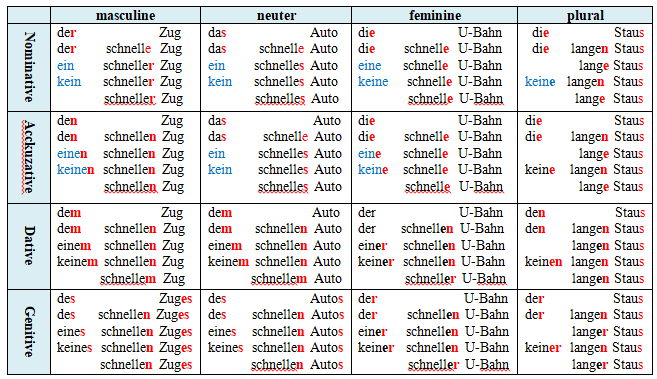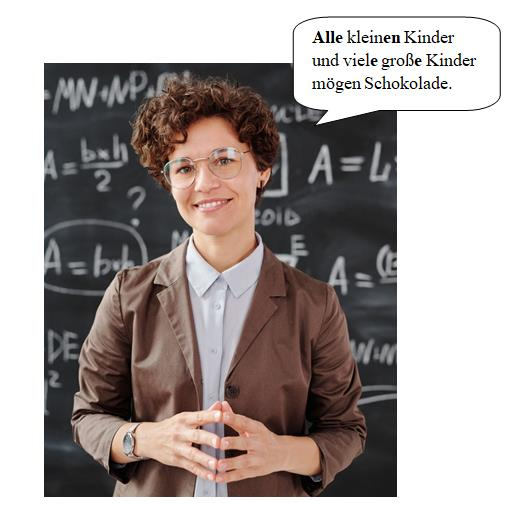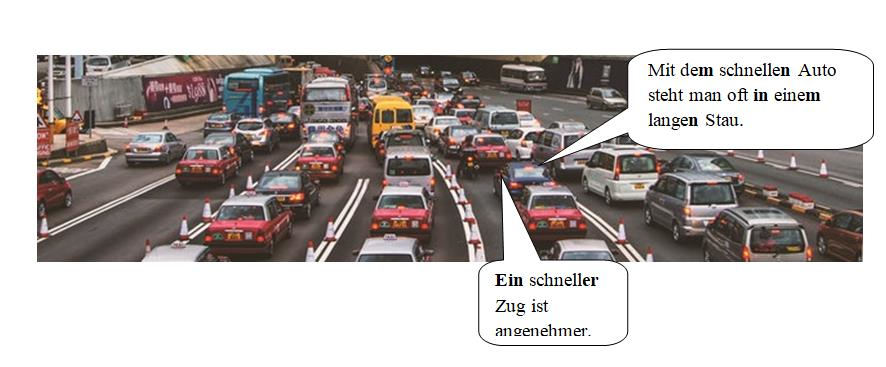In this lesson, you will learn all about German adjective declension. You will discover what can precede a noun and what can come before an adjective, as well as the endings that adjectives and determiners receive.
Thank you for reading this post, don't forget to subscribe!CONTENTS
Adjecites
Weak Declension (der,die das, dieser)
Strong Declension (der,die das)
Mixed Declension (ein, kein, mein)
Adjective Declension all in one
A few rules worth remembering ☺
Definite pronouns and adjective declension
Indefinite pronouns
Adjectives
ADJECTIVES typically qualify or describe a noun. They can be used in two main ways in German:
- Attributive Adjectives: These adjectives are placed before the noun. In this position, they take an ending that indicates the gender, number, and case of the noun.
For example:
der gute Mensch
die schöne Frau
diese grünen Äpfel
- Predicative Adjectives: When used predicatively, adjectives are placed after the noun and do not take any endings.
For example:
Der Mensch war gut.
Die Frau ist schön
Diese Äpfel sind grün.
When used with a noun, adjectives follow three basic types of declension:
- Weak Declension: This is used when the adjective is preceded by a definite article.
- Strong Declension: This is used when the adjective is not preceded by any determiner.
- Mixed Declension: This is used when the adjective is preceded by an indefinite article.
Click on:
Grammar Content
Weak declension (der,die,das, dieser)
The weak declension is typically used after the definite article and all determiners which decline like dieser. There are only two endings, -e, used in the nominative singular and the accusative singular feminine and neuter, and -en, used everywhere else:
| masculine | feminine | neuter | plural | |
| nom. acc. dat. gen. | der gute Mann den guten Mann dem guten Mann des guten Mannes | die gute Frau die gute Frau der guten Frau der guten Frau | das gute Kind das gute Kind dem guten Kind des guten Kindes | die guten Menschen die guten Menschen den guten Menschen der guten Menschen |
Adjectives describing the subject of the sentence (nominative)
The adjective endings after the + nominative (subject) are as follows:
masculine: -e
feminine: -e
neuter: -e
plural: -en
For example:
Der/ dieser junge Mann ist mein Verlobter. This young man is my fioncee.
Die / diese schöne Frau ist meine Verlobte. This beuatiful woman ist my fioncee.
Das/ dieses kleine Kind ist mein Sohn. This small child is my son.
Die/ diese jungen Leute sind meine Komilitonen. These young people are my costudents.
Der Mann/die Frau, etc. is the subject of the sentence and is therefore used in the nominative case. As you can see from the sentences above, the adjectives describing the subject in the sentences all end in -e apart from the plural which ends in -en. So that is easy to remember. ☺
Adjectives describing the direct object of a sentence (the accusative)
The adjective endings after the + accusative (direct object) are as follows.
masculine: -en
feminine: -e
neuter: -e
plural: -en
For example:
Ich sehe den jungen Mann.
Ich sehe die junge Frau.
Ich sehe das kleine Kind
Ich sehe die kleinen Kinder.
Adjectives describing the indirect object (the dative)
The adjective endings after the + dative (indirect object) are as follows.
masculine: -en
feminine: -en
neuter: -en
plural: -en
For example:
Ich helfe dem neuen Kollegen.
Ich helfe der neuen Kollegin.
Ich helfe dem neuen Mädchen.
Ich helfe den neuen Kollegen.
The dative is easy to remember – all adjectives end in -en.
Strong declension (no determiner)
Strong declension is used if there is no determiner in the noun phrase.
Making strong declension of the weak:
| masculine | feminine | neuter | plural | |
| nom. acc. dat. gen. |
The strong declension without determiner:
| masculine | feminine | neuter | plural | |
| nom. acc. dat. gen. | guter Mann guten Mann gutem Mann guten Mannes | gute Frau gute Frau guter Frau guter Frau | gutes Kind gutes Kind gutem Kind guten Kindes | gute Kinder gute Kinder guten Kindern guter Kinder |
This is not used very much in conversation except in certain expressions. The endings are the same as the endings for the definite article (the).
Mixed declension (ein, kein, mein)
There is also a ‘mixed’ declension, which is used after the indefinite article ein, the negative kein and the POSSESSIVES. After these determiners, adjectives have weak endings except in the nominative singular masculine and the nominative/accusative singular neuter. Here they have strong endings because the determiner has no ending:
| masculine | feminine | neuter | plural | |
| nom. acc. dat. gen. | ein guter Mann einen guten Mann einem guten Mann eines guten Mannes | eine gute Frau eine gute Frau einer guten Frau einer guten Frau | ein gutes Kind ein gutes Kind einem guten Kind eines guten Kindes | meine guten Kinder meine guten Kinder meinen guten Kindern⚠ meiner guten Kinder |
There are four different endings (-e, -er, -en, -es) but -en is used most.
Adjective endings after ein, mein, kein, etc. + nominative
masculine: -er
feminine: -e
neuter: -es
plural: -en
For example:
Ihr kleiner Sessel ist sehr bequem.
Eine große Tasse Kaffee schmeckt’s gut jetzt.
Ein neues Handy ist sehr gut.
Endings for adjectives describing a direct object (the accusative) after ein, mein, kein, etc.
masculine: -en
feminine: -e
neuter: -es
plural: -en
For example:
Ich kaufe mir einen kleinen Sessel.
Ich trinke gerne jetzt eine große Tasse Kaffee
Ich kaufe mir ein neues Handy.
Endings for adjectives describing the indirect object (dative) after ein, mein, kein, etc.
masculine: -en
feminine: -en
neuter: -en
plural: -en
For example:
Ich schenke meinem netten Kollegen ein Buch.
Ich schenke meiner netten Kollegin ein Buch.
Ich schenke meinem netten Mädchen ein Buch.
Ich schenke meinen netten Kollegen ein Buch.
Adjective Declension all in one

A few rules worth remembering ☺
The masculine and neuter genitive is an exception; when there is no article in front of the noun, then the adjective gets the suffix – n, and the noun – s.
▪ After possessive pronouns mein, dein …. adjectives take the same suffix as with kein.
▪ Two or more adjectives before a noun have the same suffix.
▪ An adjective following a noun does not have a suffix: Der Zug fährt schnell. Die Staus sind lang.
▪ Adjectives viel and wenig before uncountable nouns do not have suffixes: viel Zeit, wenig Geld.
▪ Adjective mehr is not declined: Sie hat viele Bücher, er hat mehr Bücher.
▪ With adjectives on – el, e is lost: komfortabel – ein komfortables Hotelzimmer.
This tip can help you in speaking: if the definite article has the suffix -n or -m, then the adjective automatically also has -n
Definite pronouns and adjective declension

All definite pronouns are declined like the definite article: mit diesem Kind, mit allen Kindern. I will give examples that have SINGULAR and PLURAL forms:
▪ dieser, dieses, diese, diese
▪ jeder, jedes, jede, plural: alle
▪ jener, jenes, jene, jene
▪ welcher, welches, welche, welche
▪ mancher, manches, manche (singular)
▪ solcher, solches, solche (singular)
Meaning of the determiners:
dieser (this)
jeder (each one)
jener (that)
welcher (which one)
mancher (many a/some)
solcher (such)
Table 1:

Pronouns that only have PLURAL forms:
▪ beide (both)
▪ die beiden (both)
▪ alle (all)
▪ sämtliche (all)
Table 2:

According to this declension, the following plural pronouns can also be changed: alle, beide, sämtlich, irgendwelche, possessive pronouns (meine, deine …) and keine.
Click on:
Grammar Contents
Indefinite pronouns
After an indefinite pronoun, the adjective is declined in the same way as the definite article.
Examples that have SINGULAR and PLURAL forms:
▪ was für ein, was für ein, was für eine, was für welche (what kind of)
▪ irgendein, irgenein, irgendeine, irgendwelche (any)
Examples that have PLURAL forms only:
▪ wenige (little)
▪ einige (some)
▪ mehrere (a few)
▪ etliche (plenty)
▪ viele (much)
▪ lauter (alone, all alone)
Indefinite pronouns (except: lauter) are declined like kein :
irgendeine Schokolade,
trotz mehrerer Auffordernungen.
Numbers have no effect on adjective endings:
(drei) schwarze Katzen,
die (drei) schwarzen Katzen.
If two definite pronouns follow each other:
dieser unser bester Freund,
alle unsere neuen Kollegen,
jeder meiner netten Freunde,
the second article, which stands directly before the adjective, determines the continuation of the adjective.
BUT: if combined with einige, viele, mehrere they act like adjectives.
For example:
viele unserer Freunde (genitive) = viele von unseren Freunden.
Solch and manch can be related to the indefinite article. Then they are similar to adjectives.
For example:
ein solcher gutter Wein,
solch (ein) guter Wein,
manch (ein) guter Wein.
In the plural, where the indefinite article is not visible, both declensions appear.
For example:
solche gute/-n Weine,
manche gute/-n Weine.
Adjectives after einige in the plural can in rare cases be declined according to the definite article. In the singular, the declension varies according to the form.
For example:
bei einigem guten Willen/ gutem Willen.
See more:



